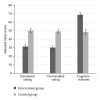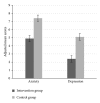Effectiveness of a cognitive behavioral therapy for dysfunctional eating among patients admitted for bariatric surgery: a randomized controlled trial
- PMID: 25147733
- PMCID: PMC4131121
- DOI: 10.1155/2014/127936
Effectiveness of a cognitive behavioral therapy for dysfunctional eating among patients admitted for bariatric surgery: a randomized controlled trial
Abstract
Objective: To examine whether cognitive behavioral therapy (CBT) alleviates dysfunctional eating (DE) patterns and symptoms of anxiety and depression in morbidly obese patients planned for bariatric surgery.
Design and methods: A total of 98 (68 females) patients with a mean (SD) age of 43 (10) years and BMI 43.5 (4.9) kg/m(2) were randomly assigned to a CBT-group or a control group receiving usual care (i.e., nutritional support and education). The CBT-group received ten weekly intervention sessions. DE, anxiety, and depression were assessed by the TFEQ R-21 and HADS, respectively.
Results: Compared with controls, the CBT-patients showed significantly less DE, affective symptoms, and a larger weight loss at follow-up. The effect sizes were large (DE-cognitive restraint, g = -.92, P ≤ .001; DE-uncontrolled eating, g = -.90, P ≤ .001), moderate (HADS-depression, g = -.73, P ≤ .001; DE-emotional eating, g = -.67, P ≤ .001; HADS-anxiety, g = -.62, P = .003), and low (BMI, g = -.24, P = .004).
Conclusion: This study supports the use of CBT in helping patients preparing for bariatric surgery to reduce DE and to improve mental health. This clinical trial is registered with NCT01403558.
Figures



References
-
- Sjöström L. Review of the key results from the Swedish Obese Subjects (SOS) trial—a prospective controlled intervention study of bariatric surgery. Journal of Internal Medicine. 2013;273(3):219–234. - PubMed
-
- Rydén A, Torgerson JS. The Swedish Obese Subjects Study-what has been accomplished to date? Surgery for Obesity and Related Diseases. 2006;2(5):549–560. - PubMed
-
- Stunkard AJ. Eating disorders and obesity. Psychiatric Clinics of North America. 2011;34(4):765–771. - PubMed
-
- Abilés V, Rodríguez-Ruiz S, Abilés J, et al. Psychological characteristics of morbidly obese candidates for bariatric surgery. Obesity Surgery. 2010;20(2):161–167. - PubMed
Publication types
MeSH terms
Associated data
LinkOut - more resources
Full Text Sources
Other Literature Sources
Medical

